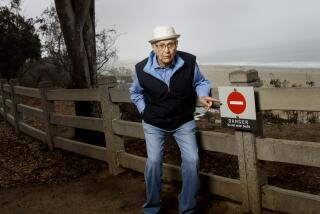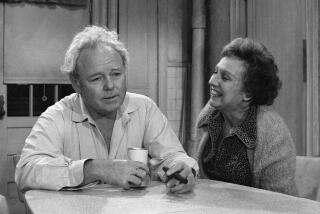Elder to Make the Judgments on ‘Moral Court’
- Share via
A locally based talk-radio host, subjected to a campaign designed to chase away the program’s advertisers, makes the jump to television this fall, headlining a new syndicated TV show grappling with issues of morality.
Dr. Laura? Well, yes, but try again.
The personality is Larry Elder, afternoon drive-time host at KABC-AM (790), and the show is “Moral Court,” the latest entry in the increasingly crowded courtroom genre, which premieres Monday.
Court shows, of course, have become all the rage on television, thanks largely to the popularity of “Judge Judy,” who dispenses small-claims justice with the swift, merciless demeanor of an old western gunslinger.
Still, it’s hard not to wonder what a politically conscious guy like Elder--whose libertarian views and broadsides directed at other black public figures have often made him a focal point of controversy--is doing in a show like this. “Moral Court” promotes the onetime attorney to judge, dressing him up in robes and asking him to deliver straight-faced moral judgments about a dwarf who objects to another dwarf’s participation in “dwarf tossing” or a matchmaking service employee whose co-worker resents her habit of dating the clients.
Elder admitted he wasn’t interested when originally approached with the idea, which was subsequently developed featuring KABC-AM colleague Dennis Prager. When Warner Bros., which is distributing the show to TV stations, had trouble selling it with Prager swinging the gavel, the producers returned to Elder, who finally relented and agreed to host. (Prager, who regularly focuses on issues of religion and ethics, remains connected to the project as a consultant.)
So what changed Elder’s mind? He said it’s because “Moral Court” “really is different” from other court shows on the air, insisting the cases aim higher than the petty squabbles and sordid affairs that populate most of daytime television.
“These aren’t your basic ‘Jerry Springer,’ lower-class people who come on TV so they can say, ‘Hi, mom,’ ” he said. “These are actual disputes between people, and they want somebody to vindicate their point of view.”
Elder, who has a new book out titled “The 10 Things You Can’t Say in America,” explored other TV opportunities that would have more closely approximated the format of his radio show, providing him greater latitude to express his political views. For various reasons, he said, most of those offers fell through.
And if doing “Moral Court” serves as a departure from his radio show, he stated, “I’ll be able to address a different audience . . . , [and] I think I have something to say to that audience as well.”
According to Elder, the matters presented him do provide an ability to showcase the host’s opinions as well as his lighter side, from a mother who wants her teenage daughter to have an abortion to a son who thinks his 80-year-old father should give up driving.
Unlike Prager, Elder doesn’t “wear my religion on my sleeve,” as he put it, saying his judgments are derived from “the basis of ethics: Don’t do to somebody else what you wouldn’t want done to yourself.”
Producer Stu Billett, who launched the genre with “The People’s Court” in the early 1980s, said television producers often err by tapping popular radio personalities without fully developing the right vehicle for them.
“Everybody wants to take top radio people and put them on television, and they all forget that you need a format,” he said.
While Elder consults with the producers on his decisions, Billett added, the verdicts rendered--carrying with them cash awards of up to $2,000--are ultimately Elder’s to make. “I tell him, ‘I may scream and yell, but you’re the judge,’ ” Billett said.
Elder continues to attract solid ratings for his radio show, which he has hosted since 1995, although that run has been marked by controversy and occasional setbacks.
In 1997, an inner-city group called the Talking Drum accused Elder of being “anti-black” because of his opposition to affirmative action and other views, waging a campaign targeting the program’s advertisers.
The following year, KABC cut Elder’s show in half, eventually restoring the program to four hours each weekday in the wake of a management shift.
Although sold to TV stations reaching nearly 90% of U.S. homes, “Moral Court” isn’t getting much respect in Elder’s backyard, either. KCAL-TV, which features Elder daily discussing an issue on his radio show during its afternoon newscast, bought the program but has scheduled it at 1 a.m., a time slot mostly relegated to infomercials and reruns.
According to Billett, part of the problem was that KABC only agreed to allow Elder to host the show if it didn’t play opposite his radio program--between the hours of 3 and 7 p.m.--in Los Angeles.
Warner Bros. is still lobbying for a daytime showing of “Moral Court,” thus far with no luck. KCAL officials didn’t return phone calls seeking comment.
Despite his own initial misgivings, Elder--who tapes episodes three days a week--now sounds bullish on “Moral Court” and its prospects. Even if stations bury the show, he maintains, it will perform well enough to win upgrades into more prominent time slots.
If so, then “Moral Court” will literally live up to its slogan, “Where it pays to be right”--which, in TV and radio, usually passes for the moral of the story.
More to Read
The complete guide to home viewing
Get Screen Gab for everything about the TV shows and streaming movies everyone’s talking about.
You may occasionally receive promotional content from the Los Angeles Times.






